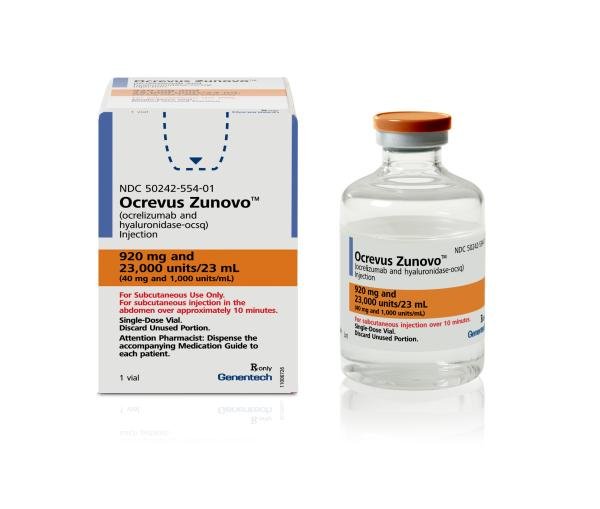Hyaluronidase / Ocrelizumab Dosage
Medically reviewed by Drugs.com. Last updated on Nov 5, 2024.
Applies to the following strengths: ocsq 23,000 units-920 mg /23 mL
Usual Adult Dose for:
Additional dosage information:
Usual Adult Dose for Multiple Sclerosis
23 mL (920 mg ocrelizumab and 23,000 units hyaluronidase) subcutaneously over approximately 10 minutes every 6 months
Comments:
- This drug has different dosage and administration instructions than IV ocrelizumab.
Uses:
- Relapsing forms of MS, to include clinically isolated syndrome, relapsing-remitting disease, and active secondary progressive disease
- Primary progressive MS
Renal Dose Adjustments
Mild Renal Dysfunction: No adjustment recommended.
Moderate and Severe Renal Dysfunction: Data not available
Liver Dose Adjustments
Mild Liver Dysfunction: No adjustment recommended.
Moderate and Severe Liver Dysfunction: Data not available
Precautions
US FDA requires a medication guide to assure safe use. For additional information go to: www.fda.gov/drugs/drug-safety-and-availability/medication-guides
CONTRAINDICATIONS:
- Active hepatitis B virus infection
- History of life-threatening administration reactions to ocrelizumab
- History of hypersensitivity to ocrelizumab, hyaluronidase, or any of the components
Safety and efficacy have not been established in patients younger than 18 years.
Consult WARNINGS section for additional precautions.
Dialysis
Data not available
Other Comments
Administration advice:
- This drug should be administered via subcutaneous injection only by a healthcare professional.
- Administer in the abdomen, except for 2 inches (5 cm) around the navel.
- Do not administer into areas where the skin is red, bruised, tender, hard, or in areas with moles or scars.
- Monitor the patient closely during and at least one-hour after the injection. Appropriate medical support to manage severe injection reactions should be available. For subsequent doses, monitor for at least 15 minutes after the injection.
Assessments prior to the first dose:
- Perform Hepatitis B virus screening.
- Perform testing for quantitative serum immunoglobulins. Consult immunology experts for patients with low serum immunoglobulin levels before starting treatment.
- Vaccination with live-attenuated or live vaccines is not recommended during treatment and after discontinuation until B-cell repletion. Administer all immunizations according to immunization guidelines at least 4 weeks prior to initiation of treatment for live or live-attenuated vaccines and, whenever possible, at least 2 weeks prior to initiation of treatment for non-live vaccines.
- Assess the presence of any active infection and delay administration until infection resolves.
Premedication:
- 20 mg of dexamethasone (or equivalent corticosteroid) orally, and an antihistamine (e.g., desloratadine) administered at least 30 minutes before the injection to reduce the risk of injection reactions.
- The addition of an antipyretic such as acetaminophen may also be considered.
Storage requirements:
- Store the vials refrigerated at 2C to 8C (36F to 46F) in the original carton to protect from the light.
- Do not freeze or shake the vials.
- Vials can be removed and placed back into the refrigerator. Unopened vials can be stored without refrigeration in the original carton for a cumulative time of 12 hours at a temperature up to 25C (77F).
Preparation and administration techniques:
- Should be prepared by a healthcare professional
- Consult the manufacturer product information for further preparation and administration instructions.
General:
- To report suspected adverse reactions, contact Genentech at 1-888-835-2555 or FDA at 1-800-FDA-1088 or www.fda.gov/medwatch
Monitoring:
- Injection reaction symptoms during and after the injection
- Level of immunoglobulins before, during and after discontinuation of treatment
- Signs and symptoms suggestive of an active infection
- New or persistent gastrointestinal symptoms suggestive of immune-mediated colitis
- Signs and symptoms suggestive of PML
- Signs and symptoms of hepatitis B reactivation in patients at risk
Patient advice:
- Read the US FDA-approved patient labeling Medication Guide.
More about hyaluronidase / ocrelizumab
- Check interactions
- Compare alternatives
- Side effects
- During pregnancy
- Drug class: CD20 monoclonal antibodies
- En español
Patient resources
Other brands
Professional resources
Other brands
Related treatment guides
See also:
Further information
Always consult your healthcare provider to ensure the information displayed on this page applies to your personal circumstances.


